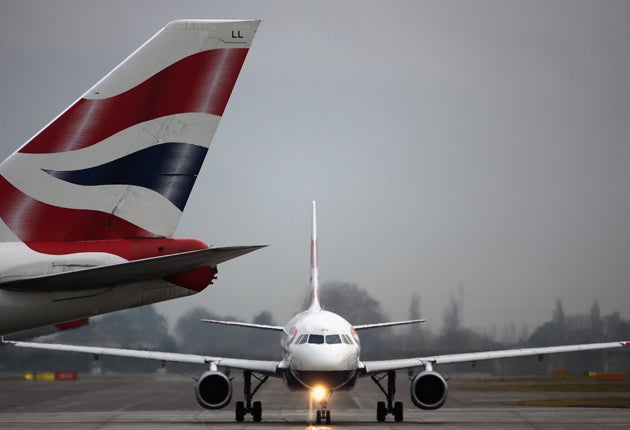BA plans to keep 60% of passengers flying

Your support helps us to tell the story
From reproductive rights to climate change to Big Tech, The Independent is on the ground when the story is developing. Whether it's investigating the financials of Elon Musk's pro-Trump PAC or producing our latest documentary, 'The A Word', which shines a light on the American women fighting for reproductive rights, we know how important it is to parse out the facts from the messaging.
At such a critical moment in US history, we need reporters on the ground. Your donation allows us to keep sending journalists to speak to both sides of the story.
The Independent is trusted by Americans across the entire political spectrum. And unlike many other quality news outlets, we choose not to lock Americans out of our reporting and analysis with paywalls. We believe quality journalism should be available to everyone, paid for by those who can afford it.
Your support makes all the difference.British Airways today announced emergency plans to leep 60 per cent of its customers flying during the planned cabin crew strike this weekend – either on its plane or other airlines – as the dispute threatened to hit Labour’s general election campaign.
With little sign of a breakthrough in the dispute between BA and Unite, the Prime Minister was dragged into a bitter political row over the party’s links with the unions. Following accusations that the Government had minced its words for fearing of antagonising Unite, Gordon Brown finally condemned the threatened strike as “unjustified and deplorable”.
The union has announced seven days of action by cabin crew over pay and staffing levels – on 20, 21 and 22 March and from 27 March to 30 March.
BA has drafted in more than 1,000 temporary cabin crew. It aims to fly 45,000 passengers each day during the first three days of industrial action. Thousands more would be offered seats on alternative flights.
Ministers are aware that a round of strikes orchestrated by Labour’s biggest paymaster on the eve of the general election campaign would hand a propaganda gift to the Conservatives. Unite has donated £11m to Labour since 2006, including £3.5m in the last year.
The Prime Minister condemned the industrial action. Toughening his language, he said: “It is the wrong time, it is unjustified, it is deplorable. We shouldn’t have a strike. It is not in the company’s interest, it is not in the workers’ interest and it is certainly not in the national interest. I hope this strike will be called off.”
In an angry retort, Tony Woodley, the joint general secretary of Unite, said: “It is rather unfortunate that politicians of all parties always want to kick the unions and kick the employees when, in actual fact, it’s my members who’ve been kicked here.”
Mr Brown’s comments also provoked a backlash from Labour MPs. Jim Sheridan urged his leader to “take a step back and have a measured approach to this”.
Baroness Hanham, the shadow Transport minister, yesterday said Labour should stop taking money from Unite. She said that Charlie Whelan, Unite’s political director, was close to Mr Brown and “up to his elbows in Labour’s General Election campaign”.
In highly charged exchanges, the Transport Secretary Lord Adonis claimed that such comments made it even harder to hammer out a dispute between BA and the union. “This is an industrial dispute. It is not a political dispute,” he insisted. “I deeply regret the attempt by the Conservative Party to politicise the dispute which will make it so much more difficult for it to be solved in the way we all wish it to be.”
BA said that during the first three-day strike by Unite, it will operate all long haul flights and more than half of short haul flights to and from Gatwick. All flights to and from London City airport will be unaffected. At Heathrow the airline will operate 60 per cent of its long haul flights. BA will not publish its schedule for the second tranche of strikes, 27-30 March, until managers can assess how the initial plans worked.
Last night the temperature increased between the airline and Unite after the company’s chief executive, Willie Walsh, claimed he had waited at the offices of the conciliation service Acas at the weekend for talks but the union failed to turn up. Unite vehemently denied this as “total nonsense” and said it had not been asked to attend talks.
In the three months since Unite called a Christmas and New Year strike following an overwhelming strike ballot – later ruled unlawful by the High Court – BA has tried to minimise the damage of another strike. A “hearts and minds” campaign to win over stewards and stewardesses did little to reduce the majority in favour of industrial action in a second ballot.
Notable omissions from the emergency schedules are Singapore and Tokyo, though BA’s alliance partners JAL and Qantas are expected to pick up many of those passengers.
Short haul travellers from Heathrow are the most heavily affected. Even with aircraft chartered in from the low-cost carriers Jet2 and Transavia of Holland, BA can guarantee only 30 per cent of its schedule. Edinburgh and Glasgow, which normally bear the first consequences of trouble at Heathrow, are off the route network for three days – though services to Gatwick and London City will continue. Scottish passengers bound for long-haul destinations may well be offered the option to transfer to carriers such as Air France, Lufthansa and Emirates. The airline has ruled out flying passengers on its arch-rivals, easyJet and Ryanair.
BA stresses that it has planned conservatively, to avoid the sort of scenes that accompanied the botched opening of Heathrow Terminal 5. But even if disruption is minimised, the poisonous dispute has already cost the carrier millions in lost revenue - and an incalculable amount in goodwill.
Join our commenting forum
Join thought-provoking conversations, follow other Independent readers and see their replies
Comments